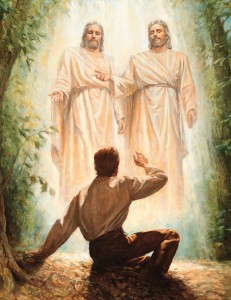
While preparing for a class, I came across this talk given by Hugh B. Brown, a member of the First Presidency of our church, who passed away some years ago. It details a conversation that he had with a member of the British House of Commons and a former justice of the supreme court of Britain regarding our belief in the reality of modern-day prophets.
I will never understand why people reject the doctrine of God still being able to call prophets. He has always done so and will continue to do so. I firmly declare that Joseph Smith was a prophet of God and that there is a prophet today who speaks for God. Prophets are essential to us knowing who God and Jesus Christ are—their characters and their teachings that will bring salvation. You too can know of this truth if you will sincerely ask God in prayer with faith to act.
“[This man] called me on the phone one day and asked if I would meet him at his office and explain some phases of my faith. He said, “There is going to be a war [World War II], and you will have to return to America, and we may not meet again.”
When I went to his office, he said he had been intrigued by some things I had told about my church. He asked me if I would prepare a brief on Mormonism and discuss it with him as I would discuss a legal problem. He said, “You have told me that you believe that Joseph Smith was a prophet and that you believe that God the Father and Jesus of Nazareth appeared to him in vision.
“I cannot understand,” he said, “how a barrister and solicitor from Canada, a man trained in logic and evidence and unemotional cold fact, could accept such absurd statements. What you tell me about Joseph Smith seems fantastic, but I wish you would take three days at least to prepare a brief and permit me to examine it and question you on it.”
I suggested that, as I had been working on such a brief for more than 50 years, we proceed at once to have an examination for discovery, which is briefly a meeting of the opposing sides in a lawsuit where the plaintiff and defendant, with their attorneys, meet to examine each other’s claims and see whether they can find some area of agreement and thus save the time of the court later on.
I began by asking, “May I proceed, sir, on the assumption that you are a Christian?”
“I am.”
“I assume that you believe in the Bible—the Old and New Testaments?”
“I do!”
“Do you believe in prayer?”
“I do!”
“You say that my belief that God spoke to a man in this age is fantastic and absurd?”
“To me it is.”
“Do you believe that God ever did speak to anyone?”
“Certainly, all through the Bible we have evidence of that.”
“Did he speak to Adam?”
“Yes.”
“To Enoch, Noah, Abraham, Moses, Jacob, and to others of the prophets?”
“I believe he spoke to each of them.”
“Do you believe that contact between God and man ceased when Jesus appeared on the earth?”
“Certainly not. Such communication reached its climax, its apex at that time.”
“Do you believe that Jesus of Nazareth was the Son of God?”
“He was.”
“Do you believe, sir, that after the resurrection of Christ, God ever spoke to any man?”
He thought for a moment and then said, “I remember one Saul of Tarsus who was going down to Damascus to persecute the saints and who had a vision, was stricken blind, in fact, and heard a voice.”
“Whose voice did he hear?”
“Well,” he said, “the voice said `I am Jesus whom thou persecutest: it is hard for thee to kick against the pricks.'”
“Do you believe that actually took place?”
“I do.”
“Then, my Lord”—that is the way we address judges in the British commonwealth—”my Lord, I am submitting to you in all seriousness that it was standard procedure in Bible times for God to talk to men.”
“I think I will admit that, but it stopped shortly after the first century of the Christian era.”
“Why do you think it stopped?”
“I can’t say.”
“You think that God hasn’t spoken since then?”
“Not to my knowledge.”
“May I suggest some possible reasons why he has not spoken. Perhaps it is because he cannot. He has lost the power.”
He said, “Of course that would be blasphemous.”
“Well, then, if you don’t accept that, perhaps he doesn’t speak to men because he doesn’t love us anymore. He is no longer interested in the affairs of men.”
“No,” he said, “God loves all men, and he is no respecter of persons.”
“Well, then, if you don’t accept that he loves us, then the only other possible answer as I see it is that we don’t need him. We have made such rapid strides in education and science that we don’t need God any more.”
And then he said, and his voice trembled as he thought of impending war, “Mr. Brown, there never was a time in the history of the world when the voice of God was needed as it is needed now. Perhaps you can tell me why he doesn’t speak.”
My answer was, “He does speak, he has spoken; but men need faith to hear him.”
(President Hugh B. Brown, Conference Report, October 1967, Third Day—Morning Meeting 118.)


